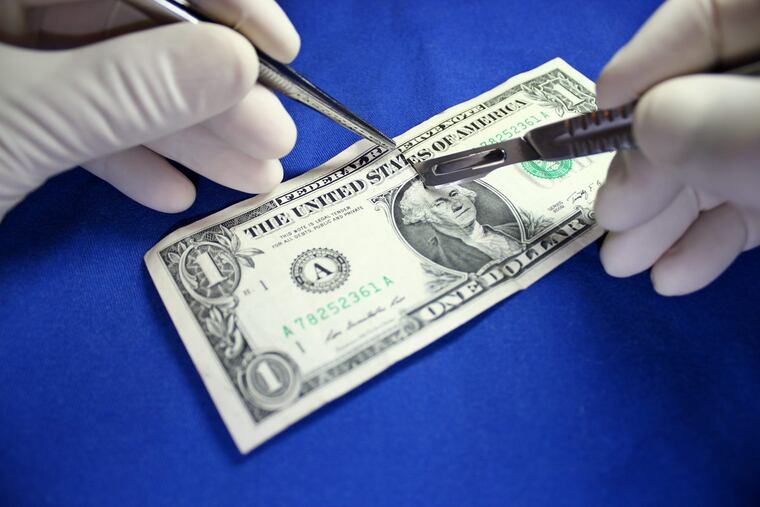Tax-cut proposals: Incentives vs. disincentives | Joel Naroff
By comparing the winners and losers in the tax proposals, you see which types of business activity or income group the politicians in Congress like, and which they don't.

What the tax-cut legislation will ultimately look like is anyone's guess, as the competing House and Senate bills seem to change daily. Nevertheless, the proposed tax modifications, whether they are included in the final bill, provide insight into which types of economic activities or incomes the Republican leadership believes should be supported and which should be discouraged.
When politicians propose changes to the way they tax a good, an activity, an industry, or a type of income, they are making value judgments about those activities. By lowering taxes on business-capital spending, for example, the message is that investing is "good." By imposing a tax on sweetened beverages, legislators are trying to discourage purchases of those "bad" drinks.
By comparing the winners and losers in the tax proposals, you see which types of business activity or income group politicians like and which they don't.
So here are just some groups the Republican tax-writers believe are worthy of lowered taxes (the good) and those they believe should be discouraged (the bad). The bills themselves are the ugly.
Big corporations, good; small businesses, bad. The biggest winners are large corporations. Their taxes are reduced, in many cases significantly. Those that have taken advantage of overseas tax havens make out like bandits. Few tax loopholes are closed to offset those tax breaks.
Meanwhile, most small-business owners get little in these bills. About 95 percent of all small-business owners make less than $150,000, with most earning less than $100,000. An accountant advised me that a small-business owner would have to make at least $200,000 to $250,000 to see real benefits.
High-income households, good; middle-income, OK; low-income, bad. Most of the income- and some business-related tax breaks go to the top 1 percent. The ending of the alternative minimum tax, the changes in the inheritance tax, and the pass-through-income tax breaks all largely benefit high-income families.
It's interesting that because of the mortgage-interest limitation and reduction in state and local tax deductions, many upper-middle- and lower-upper-income families in the Philadelphia region could see their taxes rise, some significantly.
Low- to lower-middle-income families get little or no reduction. They don't pay much tax to begin with. Middle-income families generally come out better, but many don't get anything close to the $1,000 claimed by the supporters.
That raises an important point: Beware of the use of averages when it comes to how much you benefit from the proposals. There are winners and losers in every income category. Whether your taxes go down or even up, and by how much, depends on your individual circumstances.
Capital spending on anything, good; housing, bad. There is little or no closing of any of the loopholes businesses use to write off their capital expenses, even if those tax breaks create little additional investment spending. Meanwhile, the limitation on mortgage-interest payments will negatively affect home prices and construction in many areas around the country and this region.
Budget deficits, good; fiscal responsibility, bad. The most fascinating aspect of this process is the huge swing in views about budget deficits. Republicans, who for decades claimed it was bad to keep adding to the national debt, now are supporting a massive increase of $1.5 trillion or more. Meanwhile, Democrats are demanding the Republicans pay for their tax cuts.
Hedge-fund operators, good; teachers, bad. The carried-interest boondoggle, which the president pledged to end, is intact. That provides a huge tax break for hedge-fund operators while adding almost nothing to economic activity. By contrast, teachers who out of their own pockets pay for supplies schools don't provide lose most of the deduction for those supplies.
Golf courses, good; historic properties, bad. The tax exemption that helped revitalize "historical" properties in many older cities and towns in this region is out. Meanwhile, the conservation tax dodge that golf-club developers use by saying they will "conserve" their fairways and greens is maintained. I wonder who benefits from that?
Health insurance, bad. (There is no offsetting good.) The repeal of the Affordable Care Act's individual mandate has nothing to do with taxes, though it reduces the budget shortfall significantly. But repealing it would lead to about 12 million fewer people being covered. Apparently, the Republican leadership believes health insurance isn't good.
Whatever tax bill is passed will be incredibly complex. Before you spend your tax cut, make sure you're actually getting one.
jnaroff@phillynews.com